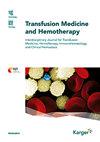Prolonged Thrombocytopenia and Severe Transfusion Reaction after ABO-Incompatible Allogeneic Hematopoietic Stem Cell Transplantation in a Patient with Chronic Myelomonocytic Leukemia
IF 1.9
4区 医学
Q3 HEMATOLOGY
引用次数: 0
Abstract
Introduction: Major ABO-incompatible allogeneic hematopoietic stem cell transplantation (allo-HCT) is a common practice and represents a challenging transfusion scenario. Prolonged thrombocytopenia with increased platelet transfusion needs is one of its reported adverse effects, and this has been linked to the persistence of recipient anti-donor isoagglutinins. Case Presentation: A 55-year-old male patient, O Rh(D)-positive, with chronic myelomonocytic leukemia underwent major incompatible allo-HCT from a A Rh(D)-negative donor. He presented with prolonged thrombocytopenia and multiple transfusion reactions after A Rh(D)-negative platelet transfusions. Considering the outcomes of numerous examinations, we tested the anti-A1 titers, finding a significant persistence of anti-donor isoagglutinins. We limited platelet transfusions to blood group O Rh(D)-negative donors, which significantly decreased the requirement for platelet transfusions. In addition, the transfusion reactions ceased. Conclusion: In case of transfusion reactions against platelet products in major ABO-incompatible allo-HCT patients, isoagglutinin monitoring should be considered and a change in the platelet transfusion protocol may be beneficial in patients presenting high isotiters against recipient’s blood type.一名慢性粒单核细胞白血病患者接受 ABO 不相容异基因造血干细胞移植后出现长时间血小板减少和严重输血反应
导言:ABO不相容异基因造血干细胞移植(allo-HCT)是一种常见的治疗方法,也是一种具有挑战性的输血方案。据报道,血小板减少时间延长、血小板输注需求增加是其不良反应之一,这与受体抗供体异凝集素的持续存在有关。病例介绍:一名 55 岁的男性患者,O 型 Rh(D)阳性,患有慢性粒单核细胞白血病,接受了来自 A 型 Rh(D)阴性供体的主要不相容异体造血干细胞移植。在输注 A 型 Rh(D) 阴性血小板后,他出现了长时间血小板减少和多次输血反应。考虑到多次检查的结果,我们检测了抗 A1 滴度,发现抗供体异凝集素显著持续存在。我们将血小板输注限制在血型为 O 型 Rh(D)阴性的献血者身上,这大大降低了血小板输注的需求量。此外,输血反应也停止了。结论如果主要 ABO 血型不相容的异体肝移植患者出现血小板产品输血反应,应考虑进行等凝集素监测,改变血小板输注方案可能对出现受体血型高等凝集素的患者有益。
本文章由计算机程序翻译,如有差异,请以英文原文为准。
求助全文
约1分钟内获得全文
求助全文
来源期刊
CiteScore
4.00
自引率
9.10%
发文量
47
审稿时长
6-12 weeks
期刊介绍:
This journal is devoted to all areas of transfusion medicine. These include the quality and security of blood products, therapy with blood components and plasma derivatives, transfusion-related questions in transplantation, stem cell manipulation, therapeutic and diagnostic problems of homeostasis, immuno-hematological investigations, and legal aspects of the production of blood products as well as hemotherapy. Both comprehensive reviews and primary publications that detail the newest work in transfusion medicine and hemotherapy promote the international exchange of knowledge within these disciplines. Consistent with this goal, continuing clinical education is also specifically addressed.

 求助内容:
求助内容: 应助结果提醒方式:
应助结果提醒方式:


